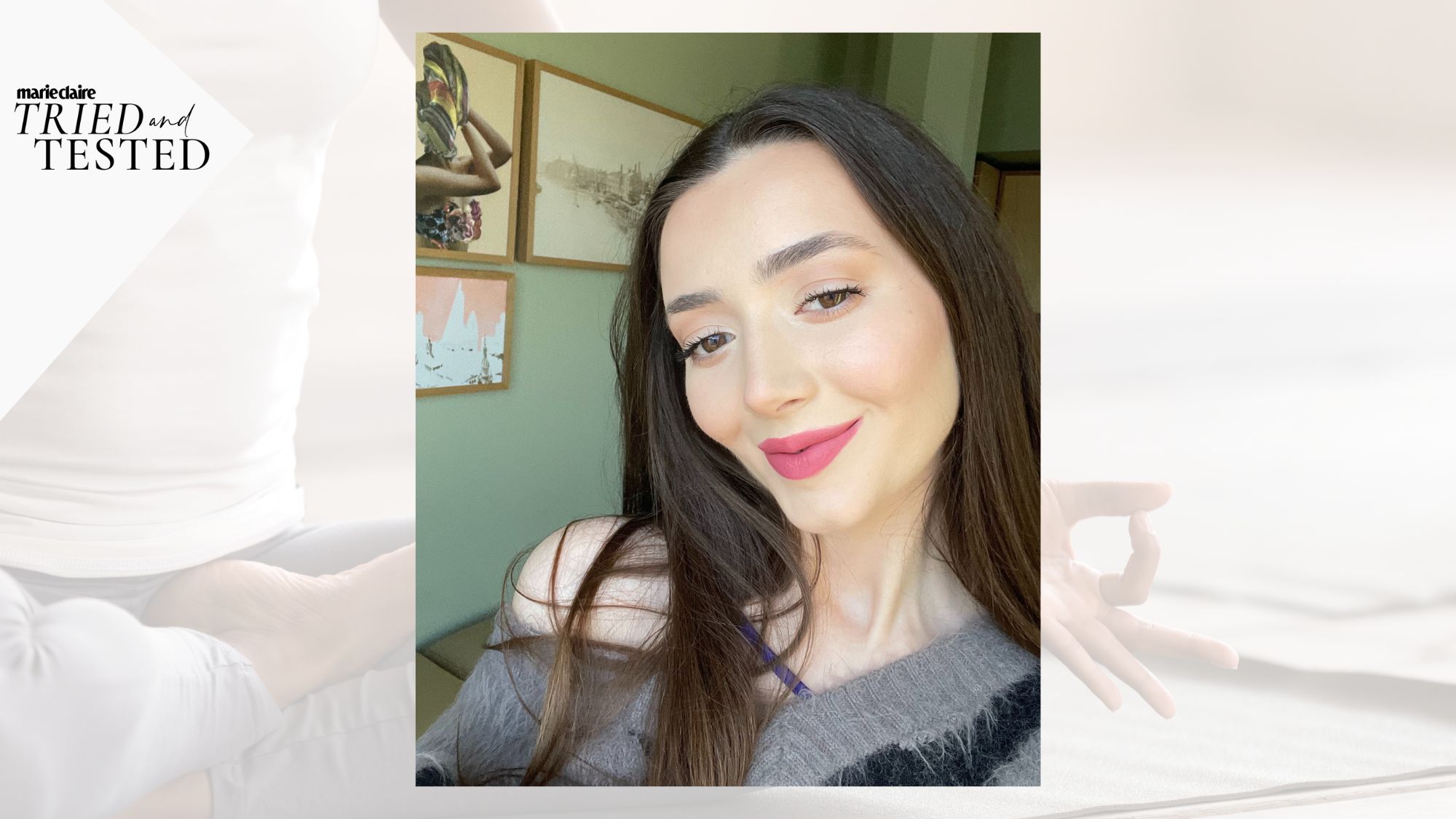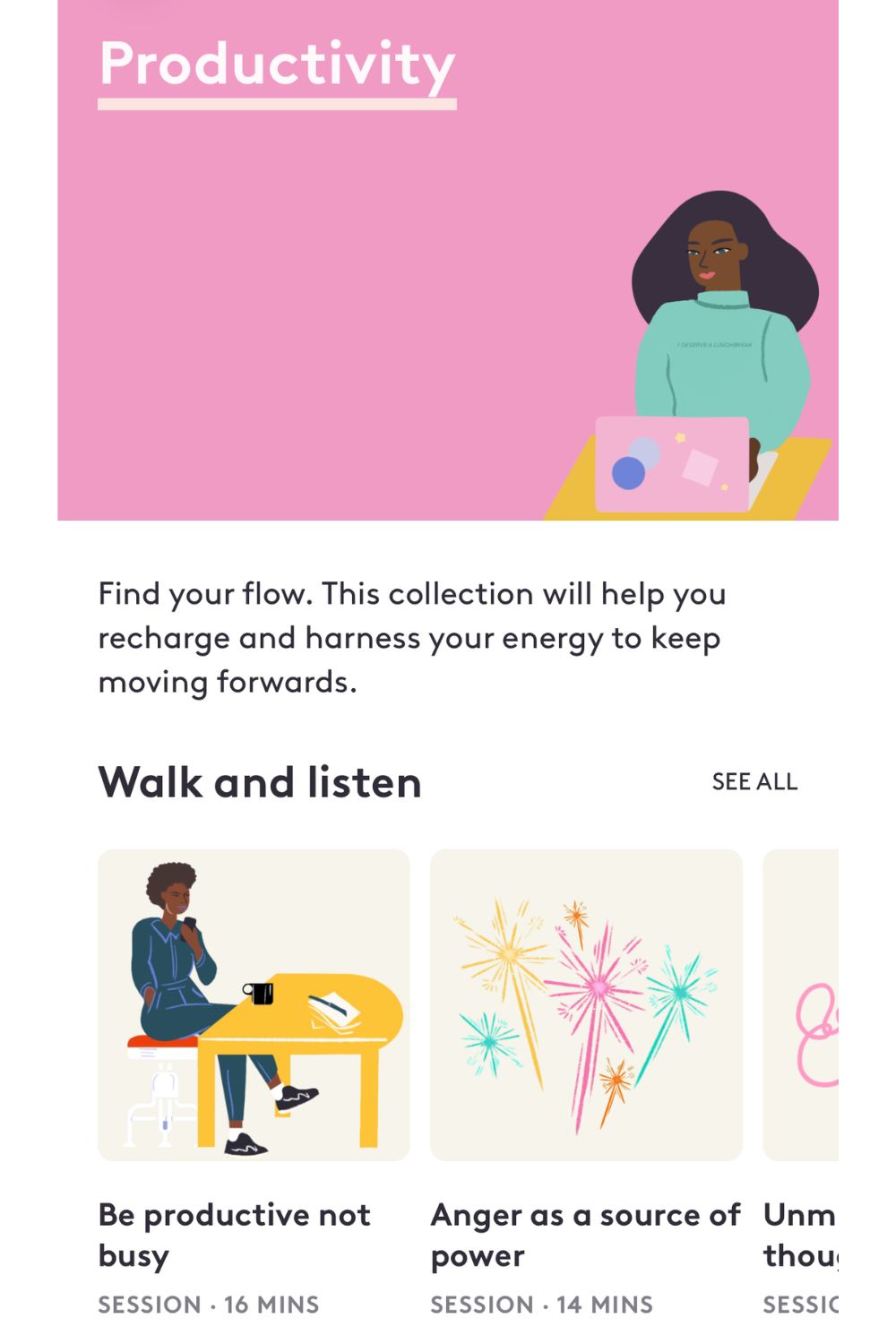I always found meditation boring - until I discovered hypnotherapy, it's positive mindset-boosting cousin
If you struggle to meditate, you'll want to give this a go.


Celebrity news, beauty, fashion advice, and fascinating features, delivered straight to your inbox!
You are now subscribed
Your newsletter sign-up was successful
As a wellness enthusiast, it feels outrageous to admit that I find meditation boring. Sorry, but I do - I get fidgety, restless, and can't stop my mind from running through my weekly to-do list.
I'd love to reap the benefits of meditation - you know, a stiller mind, peaceful outlook and positive life mantras - but it just isn't for me. That's why I was so delighted when I started testing a new hypnotherapy app and quickly fell in love with it.
When you hear hypnotherapy, you think of a magician using cloak-and-dagger tricks on stage, but it couldn't be further from the truth. While meditation and hypnotherapy are different, they actually offer similar benefits, from improved anxiety symptoms to better quality sleep.
I've tried the lot in my time - including the meditation and hypnotherapy hybrid, NSDR - but straight-up hypnotherapy on the new app I discovered remains my favourite.
Why? Well, as well as being one of the best self care apps (in my humble opinion), it teaches you the basics of hypnotherapy for all abilities. I had my first experience with hypnotherapy four years ago but re-discovering it in app form has changed my life.
Keen to read more about Clementine, the hypnotherapy app that's transformed my mental health, plus learn the difference between meditation vs hypnotherapy, and the benefits of hypnotherapy? Keep scrolling,
I'm a huge fan of this hypnotherapy app - here's why
Meditation vs hypnotherapy: what's the difference?
First things first: a little bit about the difference between hypnotherapy vs meditation. While they're often confused, the hypnotherapist I saw explained the session to me as a far more intense form of meditation.
Celebrity news, beauty, fashion advice, and fascinating features, delivered straight to your inbox!
With meditation and mindfulness, the aim is to notice and let go of your thoughts, explains Hazel Gale, Master Practitioner of Cognitive Hypnotherapy and Clementine therapist. It's about creating an awareness of what is going on both physically and mentally via simple tasks, like counting breaths or letting go of thoughts.
Hypnotherapy, on the other hand, is a type of talking therapy which normally includes two people. Stereotypically, the practitioner asks questions or talks through an issue. It's designed to work on the subconscious mind and is often hailed as an option for busy people.
The similarity lies in the relaxed state you feel post-session.
How does hypnotherapy work?
Using progressive muscle relaxation to get into a deep meditation or trance state, hypnotherapists claim you're able to access the subconscious mind.
When working with a qualified hypnotherapist in a session, they'll ask questions to delve further into the subconscious, encouraging your to visualise and remember things you haven't for years.
To begin the session, you are brought to a safe space that you can return to and even practice positive affirmations in the mirror (not as cringy as it sounds).
At first, I was seriously dubious as to whether using hypnotherapy through an app could work. While it's not the same as IRL sessions, it's not worse - just different. Take the Clementine app, for example, which uses cognitive hypnotherapy. Made for women, it combines Cognitive Behavioural Therapy, Positive Psychology and Neuro-linguistic Programming (NLP) with hypnotherapy, promising to boost your confidence, productivity and more while working on your conscious and unconscious mind to transform negative thoughts into positive ones.

Writer Dionne trying the Clementine app
The benefits of hypnotherapy
According to Kim Founder, CEO and founder of Clementine, there are a whole host of hypnotherapy benefits spanning:
- Alleviated anxiety
- Boosted confidence
- Addressing of feelings of imposter syndrome
- Improved sleep.
"Cognitive hypnotherapy can address lack of confidence and self esteem" says Palmer. "Plus, it can be used to help with imposter syndrome, poor sleep and stress," she continues.
The benefits aren't all just mental. Palmer claims it can even ease migraines and hormonal issues, including hot flushes. While more scientific research still needs to be done to validate these claims, it's interesting to see more holistic methods being encouraged for the treatment of physical symptoms.
So, does hypnotherapy work? "It changed everything for me."
With both The New Scientist and BBC reporting on the benefits of hypnotherapy, plus Adele and Reese Witherspoon sharing they used hypnotherapy for stage fright and panic attacks respectively, I've long been intrigued.
Using Clementine at home, the app uses cognitive hypnotherapy to help boost your confidence, increase self esteem, and more. How? Simply, the Clementine app interrupts negative thought patterns and replaces them with positive ones. "I chose how I respond" is one of my favourite reminders.
So, how did I get on? In a nutshell, hypnotherapy changed everything for me. I first experienced its benefits when I had a face-to-face session with a qualified practitioner four years ago. After four sessions, I'd made an ongoing problem in my life a thing of the past.
This year, I decided I wanted to give it a go again and saw the Clementine app on social media. With the knowledge that hypnotherapy does work - or at least, it does for me - I downloaded the app. I was feeling increasingly anxious again and thought it was worth a shot.
In my opinion and after testing for a few months, I can confidently say it's the best app I've used for self care, productivity and boosting my mood, now using it two to three times each day.
I start my day with a quick four-minute "I got this sh*t" session for a confidence boost. Then, as I am getting ready, I'll listen to a confidence ritual while putting on my day cream (this is also only four minutes in length but seriously effective).
As I walk to work, I'll listen to "be productive, not busy," a 16-minute session you can choose to walk and listen or rest and listen. It means I arrive in the office feeling like a boss and ready to take on the day.
Not to mention there are whole hypnotherapy sessions for sleep which are hugely beneficial and make the £4.99 subscription fee worth it for me.
While meditation never worked for me, the Clementine app invites me to question my thought processes and why I'm feeling a certain way. I like that with the guidance of Clementine, I'm able to visualise a more positive day. Plus, I've noticed that my emotional patterns have definitely improved.
While it's not a replacement for booking an appointment with a qualified therapist, it's helped me to be able to deal with negative emotions more successfully myself. If you've read my articles before, you'll know that anxiety is something I've struggled with for a while, yet the Clementine app often helps stop racing thoughts or a thumping heart.
After six months of practising in-app hypnotherapy, I'm more confident and productive. For me, hypnotherapy works - I'm always on the go, with a to-list longer than I would care to admit, and these five-minute sessions remind me that I've got this. I feel more connected to myself and overall way less anxious.
It's a win-win for me. Let me know if you give it a go.
You can get a seven day free trial to test it out, and then it's £4.99 a month or £39.99 a year.

Dionne Brighton is the Social Media Editor at Marie Claire UK. After writing about everything from nail trends to celebrity style moments for Marie Claire UK, Glamour UK and Woman & Home, she now leads the brand’s social strategy. Her work transforming Marie Claire UK’s social platforms earned her a BSME Talent Award nomination.